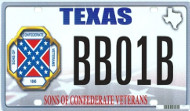3/27/2015
US Supreme Court Weighs Need For Specialty PlatesIn deciding case on Confederate license plates, the US Supreme Court could do away with personalized plates entirely.

The US Supreme Court will decide whether states have the right to decide what gets printed on a license plate. In oral arguments Monday, the justices wrestled with the question of whether the expression on a license plate -- in this case, a Confederate flag -- is the government's speech, or the motorist's speech, which is protected by the First Amendment. The court's answer could eliminate personalized license plates entirely.
In 2009, the Texas Division Sons of Confederate Veterans applied to have one of the 438 specialty plates currently offered in Texas. The design the group selected is currently available on license plates in Alabama, Georgia, Louisiana, Maryland, Mississippi, North Carolina, South Carolina, Tennessee, and Virginia. A Texas Department of Motor Vehicles (DMV) board rejected the application.
"Messages on Texas license plates are government speech," Texas Solicitor General Scott A. Keller told the court on Monday. "The state of Texas etches its name onto each license plate and Texas law gives the state sole control and final approval authority over everything that appears on a license plate... the First Amendment does not mean that a motorist can compel any government to place its imprimatur on the Confederate battle flag on its license plate."
The justices tried to determine whether the state's ability to veto offensive messages was enough to convert private speech -- the plate message chosen by the public -- into government speech. If plates are ruled to be government speech, then the government would have power to discriminate based on the plate's
message.
"Suppose somebody submitted license plate to Texas that said, 'Vote Republican' and Texas said, 'Yes, that's fine,'" Justice Elena Kagan said. "And then the next person submitted a license plate to Texas and it said, 'Vote Democratic,' and Texas said, 'No, we're not going to approve that one.' What about that?"
The alternative is to consider a license plate a public forum for private speech, like a podium at a public park where anyone can say what he pleases. Some justices remained unconvinced that what the government does with license plates could in any way be considered speech.
"The athlete doesn't advertise, you know, Nike on his jersey and Adidas on his shoes [for no reason]," Chief Justice John Roberts observed. "You can see one message. That athlete is endorsing this brand. But Texas will put its name on anything and the idea that this is their speech, again, the only thing that unifies it is they have they get money from it."
In making its case, the Confederate group insisted that anyone should be able to put whatever he pleases on a plate -- even a "Jihad" license plate if someone asks for it. Justice Scalia wondered whether if the court adopts an "anything goes" position for the plates that obscene plates would no longer be blocked as inappropriate.
"Does Texas also have specialty plates insofar as the the letters or numbers of the plates are concerned?" asked Justice Antonin Scalia. "I mean, can you get a license plate that says 'Hot Stuff' or something like that?"
The state of Texas objected that if you allow any message on the plate, inevitably you will get a request for a plate supporting Al Qaeda or Nazis. This opened the discussion of whether personalized and specialty plates are needed at all.
"Well, but there is an easy answer to that, which is they don't have to get in the business of selling space on their license plates to begin with," Justice Roberts said. "If you don't want to have the Al Qaeda license plate, don't get into the business of allowing people to buy their you know, the space to put on whatever they want to say."


